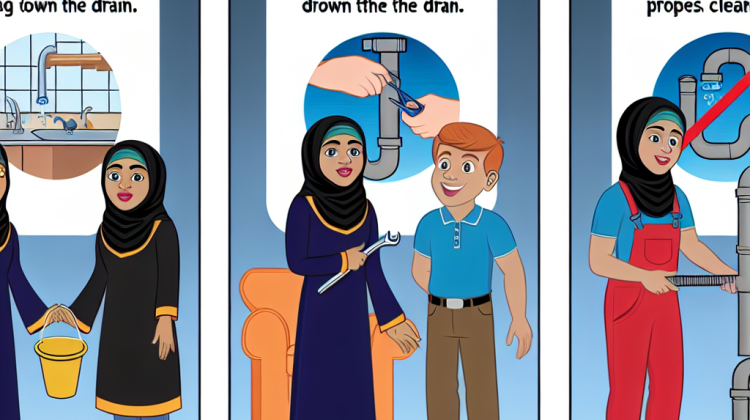
Did you know that the average person flushes the toilet about six times a day? That’s a lot of chances for things to go wrong! Keeping our pipes clear has been important for ages. Long ago, people used simple pipes made from clay or wood. Fast forward to today, and we’ve got fancy PVC piping that helps us manage water and waste better than ever. Still, those pipes can get clogged if we’re not careful.
One big reason pipes get backed up is what we toss down the drain. Hair, food scraps, and grease can create a real mess. It’s easy to think a little bit of food won’t hurt, but that tiny glob can lead to a big old headache. Instead of letting stuff go down the drain, try tossing it in the trash. Even better, keep a waste bin near the sink.
Another sneaky culprit is tree roots. You might not see them, but they’re always hunting for water. If they find a crack in your pipes, they’ll wiggle right in, causing blockages that can be tricky to fix. If you’ve got trees in your yard, consider planting them away from underground pipes. That way, you can save the trees, and your plumbing can breathe easy!
It’s also helpful to be cautious with your toilet. Flushing things like paper towels or hygiene products might seem harmless, but it’s like inviting trouble in. Toilets are only meant for the three P’s: pee, poop, and toilet paper. If you stick to that rule, your toilets will be much happier.
Every now and then, it’s good to give your drains a little TLC. Pouring hot water down your sink can help clear minor gunk that’s gathered there. If you mix in some baking soda and vinegar, it creates a bubbly reaction that can break down sticky stuff. Just be sure to rinse with hot water afterward to wash it all away!
In homes with older plumbing, you might want to be extra careful. Old pipes can wear out or get rusty over time. Regularly checking for leaks or strange sounds can help catch issues before they become big problems. If you find something odd, don’t hesitate to call a plumber. There’s no shame in getting a little professional help!
Finally, prevention is the name of the game. Installing screens over sinks can catch hair and bits of food before they go down the drain. It’s like having a little guard to protect your pipes. Just make sure to clean the screens regularly, so they don’t get clogged up themselves.
Remember, keeping your plumbing in shape isn’t just about fixing problems. It’s about taking small steps every day to keep everything flowing smoothly. With just a little attention, you can help ensure your plumbing doesn’t throw a tantrum down the line!
How to Maintain Plumbing to Avoid Clogged Lines
Keeping your plumbing in tip-top shape isn’t as hard as it might sound! A few simple habits can save you a ton of trouble down the road. First off, let’s talk about what goes down those drains.
Watch What You Flush
Most folks don’t realize that not everything is safe to flush. Only toilet paper and human waste should go down the toilet. Flushing things like wipes—even those labeled “flushable”—can cause major blockages. So remember, if it isn’t poop or toilet paper, throw it in the trash instead!
The Kitchen Sink and Grease
Oh boy, grease is a real plumbing enemy! After cooking, you might feel tempted to pour leftover grease down the sink. But let me tell you, that’s a big no-no! Instead, let grease cool, then pour it into a container and toss it in the garbage. Your plumbing will thank you!
Use a Drain Cover
Plumbing snags often start with hair and food particles getting stuck in the pipes. A drain cover can catch these bits before they get a chance to sneak down the drain. Clean it regularly to keep things flowing smoothly!
Run Hot Water
Every so often, run hot water down your drains. You can do this after cooking or once a week. Hot water helps break up any grease or soap that might be hanging around in your pipes, keeping everything clear and happy!
Regular Drain Cleaning
To stay ahead of clogs, give your drains a little TLC. Mix baking soda and vinegar together and pour it down the drain. Watch it fizz and bubble—it’s like a mini science experiment! Let it sit for about 30 minutes, then rinse with hot water. This combo can help keep your pipes sparkling clean.
Check Your Pipes
Every so often, check your pipes for leaks or cracks. If you spot any issues, fix them right away. A small leak can turn into a big problem if you ignore it. Keeping your pipes in good shape is key!
Know When to Call a Pro
If you do run into a stubborn clog that you just can’t fix, don’t hesitate to call a plumber. They have the tools and know-how to tackle those tough blockages. It’s better to let a pro handle it than to risk doing even more damage!
- Don’t flush wipes and other non-flushables
- Avoid pouring grease down the sink
- Use drain covers
- Run hot water regularly
- Try baking soda and vinegar
- Inspect your pipes often
- Call a plumber when in doubt
Fun fact: About 80% of plumbing issues stem from clogged lines. Keeping an eye on what you put down the drain will help you steer clear of that slippery slope!
“`html
How to Maintain Plumbing to Avoid Clogged Lines FAQ
1. What causes clogged drain lines?
Clogged drain lines can be caused by things like hair, soap scum, food scraps, and even grease. It’s like a traffic jam in your pipes!
2. How often should I clean my drains?
It’s a good idea to clean your drains at least once a month. Just think of it like brushing your teeth—keep things fresh and avoid problems!
3. Can I use hot water to help with clogs?
Absolutely! Pouring hot water down the drain can help break up grease and soap. It’s kind of like a spa day for your pipes!
4. What should I avoid putting down the sink?
- Grease and oils
- Eggshells
- Coffee grounds
- Fibrous vegetables (like celery)
5. How do I prevent hair from clogging my drain?
Using a drain strainer can help catch hair before it goes down the pipe. It’s like giving your drain a little safety net!
6. Is baking soda and vinegar good for my drains?
You bet! Mixing baking soda with vinegar can create a bubbling reaction that helps clear out gunk. It’s a fun little science experiment right in your kitchen!
7. What if my drain gets clogged anyway?
If you still get a clog, try a plunger or a plumber’s snake. Don’t worry, it’s nothing a little elbow grease can’t fix!
8. Should I call a plumber every time I have a problem?
Not every time! For small issues, you can handle them yourself. But if it’s a big mess or keeps happening, then calling a plumber is the way to go.
9. How do I know if my pipes are in bad shape?
Look for signs like leaks, slow drains, or strange noises. If you see or hear something unusual, it might be time for a check-up!
10. Can I use chemical drain cleaners?
It’s best to avoid chemical drain cleaners. They can be harsh on your pipes. Stick to natural solutions whenever you can!
“`
Keeping Your Pipes Happy
To avoid clogged lines, it’s super important to be careful about what goes down the drain. Make sure to only flush the things that should go, like toilet paper. Other stuff, like paper towels or toys, can cause real trouble! Also, in the kitchen, don’t pour grease or oil down the sink; it can turn into a hard mess and stop everything up. Instead, collect any leftover grease in a jar and throw it away. Plus, using a drain strainer can catch food bits, so they don’t clog your pipes.
Other easy tips include regularly checking your pipes for leaks or weird smells, which can be signs of trouble. You should also run hot water down your kitchen and bathroom sinks now and then to keep things flowing smoothly. Having a professional check your plumbing once in a while can also help prevent big problems. So remember, taking these simple steps can keep your plumbing in tip-top shape and help avoid those annoying clogs that make life a lot harder!
